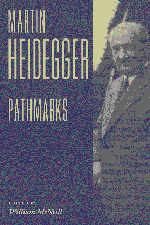Book contents
- Frontmatter
- Dedication
- Contents
- Editor's Preface
- Preface to the German Edition
- Comments on Karl Jaspers's Psychology of Worldviews (1919/21)
- Phenomenology and Theology (1927)
- From the Last Marburg Lecture Course (1928)
- What Is Metaphysics? (1929)
- On the Essence of Ground (1929)
- On the Essence of Truth (1930)
- Plato's Doctrine of Truth (1931/32, 1940)
- On the Essence and Concept of Φύσιζ in Aristotle's Physics B, I (1939)
- Postscript to “What Is Metaphysics?” (1943)
- Letter on “Humanism” (1946)
- Introduction to “What Is Metaphysics?” (1949)
- On the Question of Being (1955)
- Hegel and the Greeks (1958)
- Kant's Thesis about Being (1961)
- Notes
- References
- Editor's Postscript to the German Edition
Letter on “Humanism” (1946)
- Frontmatter
- Dedication
- Contents
- Editor's Preface
- Preface to the German Edition
- Comments on Karl Jaspers's Psychology of Worldviews (1919/21)
- Phenomenology and Theology (1927)
- From the Last Marburg Lecture Course (1928)
- What Is Metaphysics? (1929)
- On the Essence of Ground (1929)
- On the Essence of Truth (1930)
- Plato's Doctrine of Truth (1931/32, 1940)
- On the Essence and Concept of Φύσιζ in Aristotle's Physics B, I (1939)
- Postscript to “What Is Metaphysics?” (1943)
- Letter on “Humanism” (1946)
- Introduction to “What Is Metaphysics?” (1949)
- On the Question of Being (1955)
- Hegel and the Greeks (1958)
- Kant's Thesis about Being (1961)
- Notes
- References
- Editor's Postscript to the German Edition
Summary
[145] We are still far from pondering the essence of action decisively enough. We view action only as causing an effect. The actuality of the effect is valued according to its utility. But the essence of action is accomplishment. To accomplish means to unfold something into the fullness of its essence, to lead it forth into this fullness – producere. Therefore only what already is can really be accomplished. But what “is” above all is being. Thinking accomplishes the relation of being to the essence of the human being. It does not make or cause the relation. Thinking brings this relation to being solely as something handed over to thought itself from being. Such offering consists in the fact that in thinking being comes to language. Language is the house of being. In its home human beings dwell. Those who think and those who create with words are the guardians of this home. Their guardianship accomplishes the manifestation of being insofar as they bring this manifestation to language and preserve it in language through their saying. Thinking does not become action only because some effect issues from it or because it is applied. Thinking acts insofar as it thinks. Such action is presumably the simplest and at the same time the highest because it concerns the relation of being to humans. But all working or effecting lies in being and is directed toward beings.
- Type
- Chapter
- Information
- Pathmarks , pp. 239 - 276Publisher: Cambridge University PressPrint publication year: 1998
- 23
- Cited by



